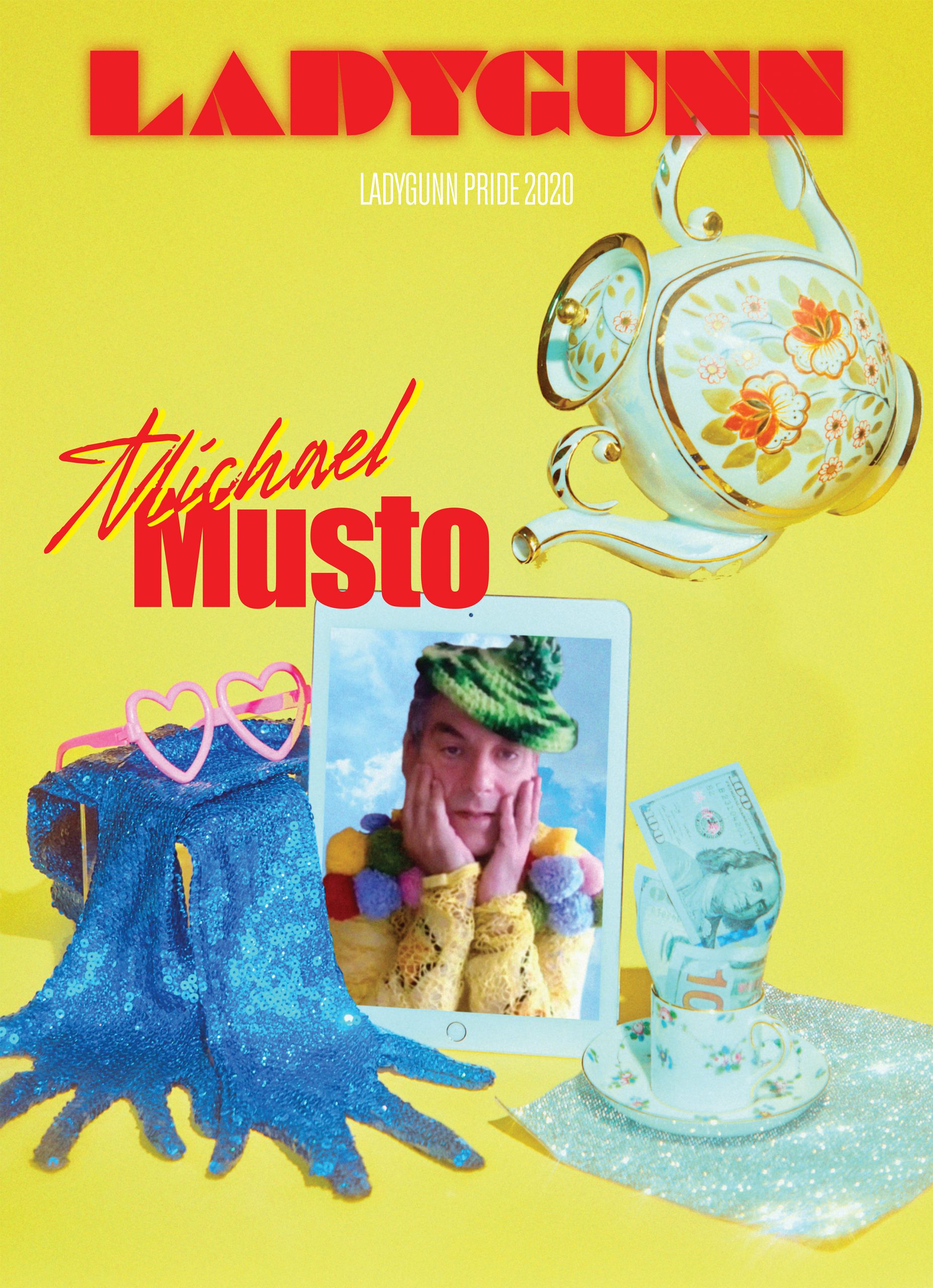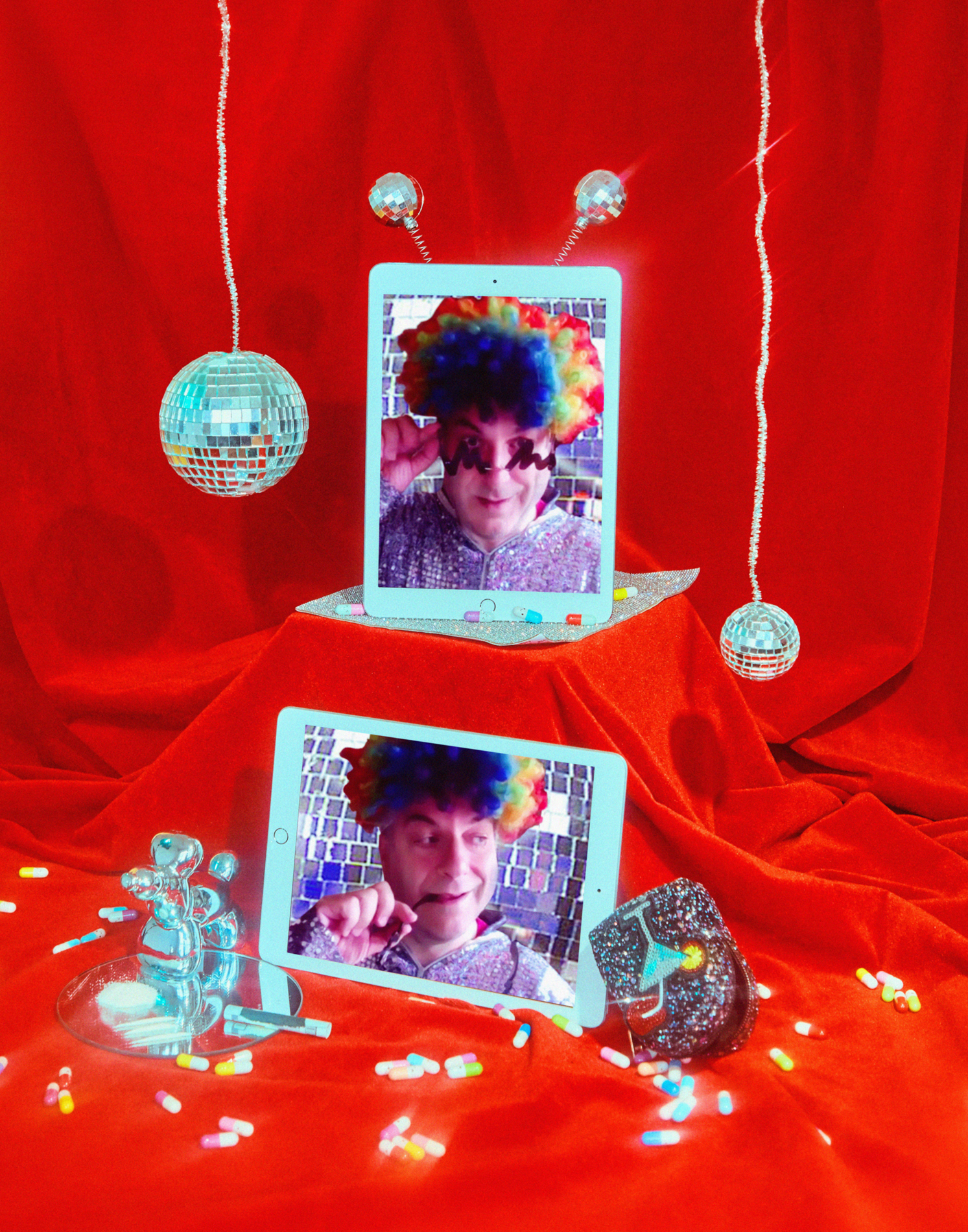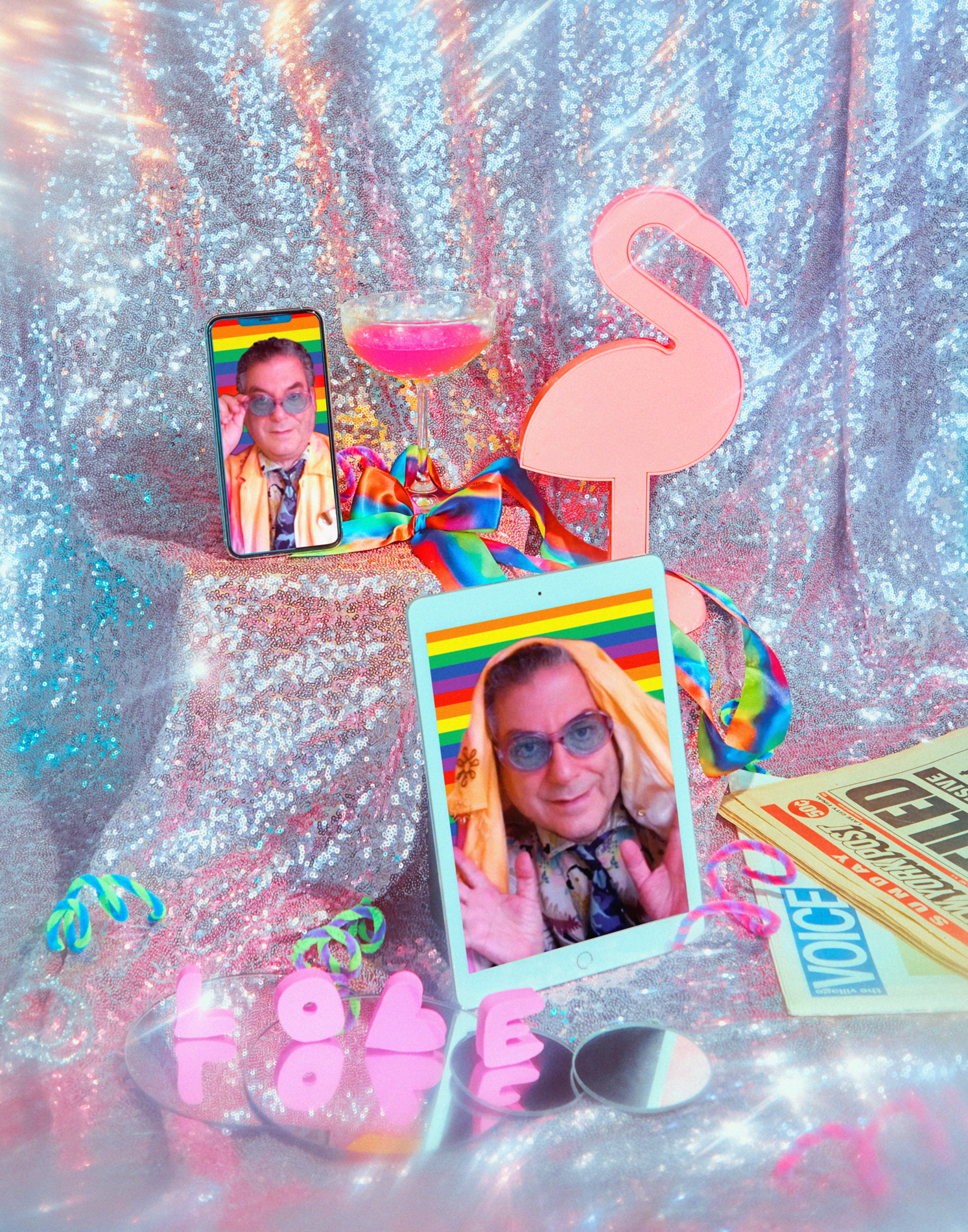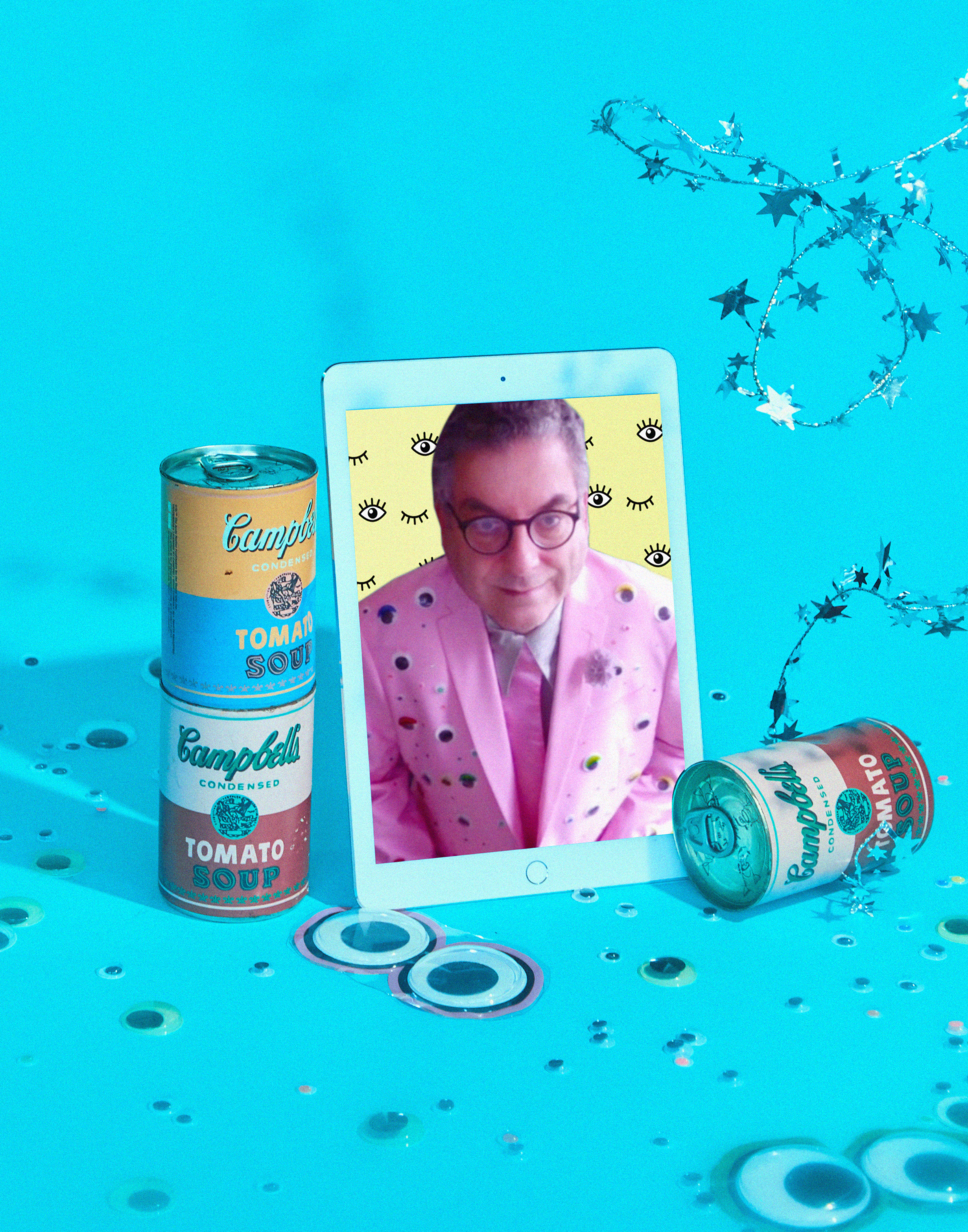
eyewear, ISLY. Pom Pom shirt, Claire Fleury. Gold pendants, We Who Prey.
It has taken many years and cost us many lives to achieve the modicum of queer representation we now have in the mainstream. The LGBTQ community, more catalyzed than ever to action in 2020, owes so much to our brothers and sisters who have been in this fight for decades. Michael Musto, the longtime journalist, and glittery New York City personality is one such trailblazer.
Raised in Bensonhurst, Brooklyn, Musto attended Columbia University, where he found his chops as a theater critic for their college paper. After graduating in 1976, Musto immersed himself in the many nightlife scenes Manhattan had to offer, from the glitzy jet-set crowd at Studio 54 to the nonstop ravers and club kids at Tunnel. A member of New York’s Act Up in 1987, Musto was also heavily involved in social justice early on. Over the years, Musto’s joie de vivre helped him gain access to some of the most important and influential social circles of the late 70s’, 80s’, 90s’ and beyond. Musto became something of a star himself; his writing has regularly appeared in publications like The Advocate, Out, The New York Times, and of course, his much-lauded column in the now-defunct Village Voice won him infamy in a town where notoriety was currency. His fearless writing style — wherein he would contextualize, in gory detail, the goings-on and the who’s who of both the uptown and downtown worlds — mixed well with his flamboyant persona, and got the bon-vivant invited onto national television on channels like VH1, MTV, and E!, back when out of the closet personalities were rare, if that. Never having really been in the closet in the first, Musto evolved into a media go-to for cultural commentary and discussion on a litany of topics, not least of which being homosexuality and the cultural trappings which surround it. Musto, to his credit, achieved all this and better before people like Rachel Maddow were putting on power pantsuits for their own shows on MSNBC, or before a certain Bravo ringleader began Real Housewife-ing every city in America.
Currently, in quarantine in his NYC apartment, Musto has, through social media, been reading, watching, and listening to the world around him change and catch up, socially, to his standards of a radically free life. After an at-home photoshoot with us, we Zoom-ed with the LADYGUNN cover star to discuss his early days as a gay journalist; his relationship with Andy Warhol; the state of queer media now; how New York City might bounce back from the worst crisis it has ever seen; and the importance of LGBTQ+ support for the BLM movement, especially during Pride.

eyewear, ISLY.
In Musto Unfiltered, your column for NewNowNext, you wrote that you often feel like you don’t get the recognition for being the gay as hell pathfinder that you have been for decades. A cover like this, does it lift your spirits?
It’s always nice to get validation and I’m not just patting myself on the back. Back in the 80s’, when I was doing segments on MTV, there was little out gay presence on television. I made an even bigger splash in the 90s’ on the E! channel. For seven years I was an openly gay gossip correspondent there. And now when they do these remembrances of out, on-air personalities, they remember the ones who came out later and made it bigger. You know, the Anderson Coopers and the Ellens. I totally get that I am not in that league, but there were people who paved the way for them. In fact, I was outing both in my Village Voice column while I was already an out on-air personality, so I was not being hypocritical. I was saying, I’m out; why don’t you come join me? So, it’s funny that the people I was begging for years to come out, they’re now thought of as the trailblazers. And so, I want to make sure that I’m in the history books!
Journalism is under attack from all sides; from the government, from COVID’s economic impact, and from the fringe, right-wing members of the public. What advice can you give to a new generation of media folk who are freaked out by the state of the world right now?
Well, first, you can blame Trump on the demonization of journalists. Anyone who does their job and tells the truth is labeled fake news. Whereas every single syllable that he spouts is fake news. The hatred of journalists that he has stirred up is outrageous and irresponsible, and it appeals to a certain fan base that feels the New York Times is too hard for them to grasp, so they’d rather just say it’s all baloney. Combine that with what was already happening before in the world of journalism in terms of the economy, and I’d say it’s very difficult to make the kind of living as a journalist that I did when I started out. In the 80s’, I was one of a handful of columnists in town, there were no social media, and there were plenty of opportunities. Now everyone on Earth is a columnist because everyone has a Facebook page or a blog or social network that they can express themselves on. And it turns out many people can be witty and have some great insights… Except for the morons. I hate to be the kind of person that says do not go into journalism because there are people who told me that when I started, and I ignored them. So, if I were you, and I told you that, I would ignore me too. But only go into journalism… if you really can’t do anything else. If you really have a passion for it, you’re good at it, you’re professional, you’re aggressive, and you’re not afraid of deadlines. Just be aware that it’s going to be challenging economically right now. Plus, you’re now targeted as a bad person by the President.
Speaking of the world falling apart; you’re a born and bred New Yorker. How are you feeling about the pandemic wreaking havoc across your hometown? Can NYC bounce back?
Of all the horrible periods that I’ve lived through, this is the worst. We’ve all had people close to us die of COVID. We’re living in a combination of grief and terror and anxiety because there’s so much unemployment resulting in the lockdown… which absolutely was essential but devastating. And I really think that has now fueled all the protests. The hopelessness about COVID has spurred people to action on racial issues more than in the past. And right now, you don’t know if you leave the house, if a cop is going to throw tear gas at you or if you’re going to catch a deadly virus. And the temptation is just to lock yourself in and not engage with the world. But I’m not going to do that. I’m not going to become Miss Havisham from Great Expectations, covered in cobwebs. Even at my age, I am brave and I’m going to live my life. And are we going to get through it? Yeah, we are. We’ve gone through so many things in this city. I was here for 9/11, a lot of people left after that. There was no way I was gonna leave New York. New York is my lady. I mean, I can’t exist anywhere else. I can’t drive. If I moved to LA, I’d be waiting for pickups all day. But here I just toddle around on my little Kmart girls’ bicycle and I’m fine. No, I’m not leaving. And I’m hearing complaints. You know, for years you heard New York is too slick. It’s too rich. It’s Disney. Now you’re hearing, it’s too dangerous and too edgy. We get it from both ways. But whatever it is, it’s always gonna be New York. And I’m sure the value of my apartment is plummeting as we speak. But I’m gonna weather this, and there are much bigger problems in the world than the value of my apartment.
And what are your plans for this very strange summer ahead of us?
I’m going to watch a lot of old movies for the 18th time. And I’m going to write about all the issues of the day, from the plague to the racial horrors being inflicted by the police.
You’ve been front and center to many past social justice movements, and you’re a member of Act Up. What do you think about the current protests?
It’s ironic that we’re protesting police brutality and they respond with police brutality. But I’m all for safe protests. I heard somebody complaining about graffiti on St. Patrick’s Cathedral. Seriously? Boo fuckin’ hoo. The Church has destroyed so many lives with their misguided interpretation of God’s word. They’re gonna have to deal with a little graffiti. I’m glad that the anger is being channeled in a way that we’re making ourselves heard. Because this must stop. When I heard the preliminary autopsy report on Floyd, it was outrageous that they would say that he may have been drunk and that was a factor. More irrelevant distractions that muddy the waters, blames the victim, and tries to get another fucking psycho cop off the hook.
What do you think about the relation between LGBTQ+ activism and the BLM movement?
I do think that the queer community needs to stay continually active through all this, not just for Pride. Larry Kramer (the late Kramer was a longtime activist and outspoken queer organizer), rest his soul, one of his biggest complaints was that the younger generations never do enough, that they’re not out in the streets enough. Larry was always lighting a fire under people’s asses and just saying, do more, be angry, act up! Trump is taking away privileges and protections and rights. One by one. And we’re just sitting there. We’re angry and we’re venting to each other on Facebook, but that doesn’t change anything. So we really have to be vigilant and we really have to be very vocal.

eyewear, ISLY. Yellow patch shirt, Gypsy Sport. Gold pendants, We Who Prey.
We truly lost someone special when we lost Larry. Would you say the mass protests for radical change happening all over the world would likely make Mr. Kramer happy?
Absolutely. But he is watching over them like a guardian angel, thrilled at the way the mass outrage is being channeled into group action that is changing the world. I’m sorry Larry didn’t live to see all of this.
Agreed. Well… this is about you. Let’s take a step back, into your past.
So, we’ll start at the Civil War?
Yes, 1861.
Perfect!
Tell us about your early years as a queer columnist and guy about town in NYC?
Well, my column in the Voice didn’t start till 1984. Before that, I wrote for the Soho Weekly News, which was an alternative weekly. I wrote for After Dark which was a gay magazine that never said it was a gay magazine. I wrote for Us magazine. Talk about Pride, I interviewed the Village People for a cover story. At that point, they were not out, but there were and still are millions of people who just think they were macho men. When “YMCA” is played at a Trump rally, the idiot doesn’t even know it’s a song about like, slipping on cum in the restroom at the Y. I did the Bee Gees, who at the time were the biggest thing in creation, and they told me that eventually, they were going to break up, and that became a big story. And in the Soho News, I covered Studio 54. And I wrote about the Mudd Club which was like the anti-Studio 54. It was a little rock and roll new wave dive in Tribeca, back when Tribeca was a complete wasteland. I loved traversing both of those worlds. I love the glitzy uptown, celebrity-filled world, and I love the cool, anti-establishment downtown worlds. And that defined my nightlife career. I realized early on I wanted my finger in every pot, I wanted to write about theater, movies, celebrity gossip, interviews, nightlife, gay life. I never felt like a dilettante. I felt more like I really am passionate about all these things. And just like at Columbia, where I was involved in everything — I wrote about theater, I was in the theater, I was in every activity you can imagine — I just carried that through to my postgraduate life where I’m involved in so many things that it’s like mind-boggling. I don’t know where I get the energy. I guess coffee.
Which memory helps you stay positive right now?
We tend to look at the past through rose-colored glasses. A lot of people in the nightlife scene are nightmares. The word night is the through-line there. It’s kind of a dysfunctional family that comes together. The wonderful thing is that we all accept each other and celebrate with each other for things we may have been made fun of for back in the high school cafeteria. But some people are a little too needy and especially me as a columnist, I was always a magnet for people to come up to and yammer away. But I always appreciated Suzanne Bartch’s parties. Starting in the 80s’ she led this gigantic conga line of every kind of person that made New York interesting. It could be club kids, it could be a CEO, it could be a lesbian, it could be just a bridge and tunnel, boring people… all thrown together in this decadent but very safe and accepting world that made, and still does. I mean, there’s not even any need for nostalgia because she’s still doing it. Now she’s doing them online.
Susanne’s Thursday night “On Top” Zoom parties are fun!
I’m sure, but I can’t do the online parties. I just don’t think they’re really the same. It’s not the same. And I don’t want to get into the Stockholm Syndrome where like, this becomes my way of life. It might be easy once this is all over to say, I’m never gonna go to a movie theater again. Never gonna go to a gallery again. Never gonna go to a party again. And I think that is potentially very dangerous.
Warhol would hate that mentality. Care to share some fond memories of the OG pop guru?
In the 70s’, an established columnist named Bob Weiner took me under his wing. Bob was friendly with Andy Warhol and set up a meeting with me, him, and Andy at the Factory, so we could pitch screenplay ideas. I was so nervous and in awe that I could barely speak, but I did manage to mention the possibility of a sort of campy, tongue in cheek disaster movie featuring characters like an actress who brazenly kept her two Academy Awards in her bra. Andy liked that and brightened when I said it, though nothing whatsoever came of the meeting. It didn’t matter. I had met with the great Andy Warhol and that was the reward in itself! Then, in the ’80s, Andy came to one of my events, gave me a blurb for my book Downtown, and even posed holding up the cover, which meant a lot to me. I feel his benediction meant everything — he was the king — and when he entered a room, you always knew you were in the right place. His death in 1987 was a devastating blow to the scene, though I wrote a column mocking some of the crocodile tears from the suddenly-dressed-in-black attention seekers at his memorial. I felt like the commemorative speeches didn’t capture the real person. Andy could be quite the master manipulator… and were lauding him as a fantasy figure. I did not understand the point of doing that. He was a real, complicated person, and should be remembered as such, along with being a multimedia genius and visionary. Anyway, I’m thrilled to be mentioned in his extremely readable diaries!
Today, mainstream culture is gayer than ever before. Aside from your own efforts, how do you think that happened? And when did it happen?
Harvey Firestein always said that as a direct result of AIDS, the gay community became noticed by the world. It was a horrible way to be noticed, but in a way, it mobilized the people that were surviving to be more visible than ever, it forced people out of their closet. And it created a whole new genre of gay culture that won awards and attracted huge audiences. Right now, it’s very uncool for someone to be in the closet, it’s almost unheard of. Right? I’m very happy that I may have had a small part in creating a world where the closet is a bad thing. Gay issues are covered by all the media now. So queer media is not as strong as it used to be, quite frankly. They’ve been supplanted by everyone else covering the same thing. I do think it’s important to have queer issues and personalities covered by queer people, for queer people. I pray that that niche market always stays.
And how are you feeling this Pride season?
No number of crises in our culture will ever dampen my pride. In fact, as our rights are under serious threat thanks to Trump, I’m more of a one-man Pride Parade than ever!
America is tepidly getting back out there. Have you done anything yet?
I recently did my first TV interview in an awfully long time, for ABC. But it was a gigantic studio, the interviewer was behind a screen. And there was a boom mic, nobody came near me or touched me, I did my own makeup. Just like Lady Gaga. There were two other people there, maybe 80 yards away. So I feel like we’re starting to maybe get back into doing the things we used to do, but under the new rules, and it felt great to do a TV interview because it was not about COVID. It was just about the 90s’ and celebrity culture. It felt good, as superficial as a topic as it was, to be talking about something that was not a tragedy or current crisis.
And now that COVID may have changed everything about cities as we know it, can we find new ways to flourish in them?
Well, part of me thinks, you know what, I’ve seen a lot of Broadway shows in my lifetime. I’ve gone to a lot of nightclubs. I could hang on for some time and not do any of that for a while. I can live without another Music Man. Fiddler on the Roof, whatever is coming down the pipe. That being said, I live for that stuff. This is what I do. I also feel lost without it. I used to go out every night to a myriad of things, whether it be screenings, plays, parties, events, and then write about them. That’s not an option now. But we just find other things to write about. We’re writing about COVID. We’re writing about lockdowns; we’re writing about protests. That’s actually a lot more interesting than theater, at this point. And I don’t think it’s going to make concert reviewers obsolete. We just must get through this phase. We will always be cautious. But the culture is going to come back with a vengeance. People are going to want to connect, be face to face to see their favorite performers up close and personal. I don’t want to see Lady Gaga with no makeup all the time, and I definitely don’t want to see Madonna in her bathtub. Enough with the demystification. Let’s bring back production value!
Yes! Full fantasy, every time.
That is why we turn to entertainment. It is an escape and it’s a catharsis. It is a fairytale. And we need that.

CONNECT WITH MICHAEL MUSTO:
FACEBOOK // TWITTER // INSTAGRAM
photos / savanna ruedy
creative direction + styling / phil gomez
In conversation with / Alex Blynn
editor / koko ntuen
